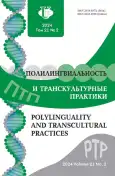Chronotope of D. Nakipov’s Novel “The Circle of Ash.”
- Authors: Ovcherenko U.V.1, Shchennikova N.V.1
-
Affiliations:
- RUDN University
- Issue: Vol 21, No 2 (2024)
- Pages: 250-259
- Section: LITERARY SPACE
- URL: https://journal-vniispk.ru/2618-897X/article/view/326933
- DOI: https://doi.org/10.22363/2618-897X-2024-21-2-250-259
- EDN: https://elibrary.ru/NBUIBI
- ID: 326933
Cite item
Full Text
Abstract
In the context of the predominance of polystylistics as a method of creating a modern Kazakh translingual novel, the research into new ways of realizing the author’s intention is extremely relevant. This study addresses the problem of chronotope in D. Nakipov’s novel “The Circle of Ash,” as well as the goal pursued by the author when choosing a specific representation of the space-time continuum in the work. A detailed analysis and a comparison of two layers of the narrative was made: the existence of the Samion tribe and the existence of the Onosam civilization. With the help of consecutive comparisons of the two worlds, not only the difference between the two cultures is emphasized, but also the points of their contact. The position is substantiated that two different worlds are a single chronotope of the novel. The study reveals the intention of the work which is that D. Nakipov demonstrates what kind of decadence the rejection of naturalness, the naturalness of being, can hypothetically lead to, what the desire to enclose living life within the framework of industrialization can lead to, how detrimental the impact of isolation from roots and the past can be. According to Nakipov, not a single scrupulously verified and refined convention cannot generate freedom and, by definition, cannot be as fruitful as wild but bright primitive chaos. In addition, the contrast between the Samion tribe and the Onosam civilization serves to express an idea common to Kazakh Russian-speaking writers - the idea of the absolute connection of all things between times and spaces. The article also records the peculiarity of the formation of objectification of the chronotope in the postmodern novel with the help of artistic detail. Even though the novel “The Circle of Ash” cannot be unambiguously attributed to postmodernism, it is still impossible not to say that the features of this literary movement are present in the novel. The objectification of the chronotope in the novel is the Kazakh archetype of the circle, which emphasizes the idea of the Absolute expressed in the novel.
About the authors
Uliana V. Ovcherenko
RUDN University
Author for correspondence.
Email: ovcherenko1993@gmail.com
ORCID iD: 0009-0004-8706-6906
Doctor of Philosophy in Philological Sciences, teacher of the Department of Russian Language and Intercultural Communication, Institute of Russian Language
6 Mikhlukho-Maklaya St, Moscow, 117198, Russian FederationNina V. Shchennikova
RUDN University
Email: ninashenn@gmail.com
ORCID iD: 0000-0001-8493-0827
Doctor of Philosophy in Philological Sciences, Assistant professor of the Department of Russian Language and Intercultural Communication, Institute of Russian Language
6 Mikhlukho-Maklaya St, Moscow, 117198, Russian FederationReferences
- Bakhtin, M.M. 1975. Questions of literature and aesthetics. Moscow: Khudozh. lit. publ. Print. (In Russ.)
- Galperin, I.R. 2005. Text as an object of linguistic research. Мoscow. Print. (In Russ.)
- Turaeva, Z.Ya. 1986. Linguistics of text: (Text: structure and semantics): textbook for pedagogical students. Moscow: Enlightenment publ. Print. (In Russ.)
- Sirotkin, Yu.L. 2022. “Anthropological nature of M.M. Bakhtin’s chrontope.” Izvestiya Sarat. Universita. Nov. Ser. Philosophy. Psychology. Pedagogy, no. 3, pp. 277–282. (In Russ.)
- Ryabova, M.Yu. 2014. “Anthropocentrism of linguistic categories: chronotope.” International Journal of Cultural Research, no. 2 (15), pp. 79–83. (In Russ.)
- Kalimullin, D.D. 2017. “Chronotope in humanitarian knowledge.” Social and humanitarian knowledge, no. 10, pp. 115–121. (In Russ.)
- Altybaeva, S.M. 2018. Kazakh prose of the period of Independence: tradition, innovation, prospects: monograph. Almaty: Gylym publ. Print. (In Russ.).
- Nakipov, D. 2005. The Circle of Ash. A novel of intentions. Almaty publ. Print. (In Russ.).
- Filatov, V. I. 2014. “Dystopia of the 20th century as a method of predicting the future.” Bulletin of Omsk University, no. 4 (74), pp. 84–86.
- Grishkova, L.V. 2009. “Chronotope of the postmodern novel.” Bulletin of Kurgan State University, no. 2 (16). pp. 80–82. (In Russ.).
Supplementary files









